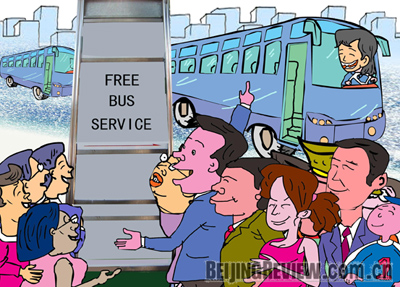|

Ever wished public transportation was free? Well, if you're in Changning City, central China's Hunan Province, your wish just came true. Starting from July 1, local residents and visitors enjoy a free ride along the city's three public transportation lines and the government has allocated 7 million yuan ($1 million) to facilitate the initiative.
According to the local media, on the first day of the free public bus service, passenger numbers jumped by over 60 percent.
The move is unprecedented in China. Elsewhere in the country the public transportation system follows a market-oriented model, with the government offering financial subsidies.
Why does Changning's local government choose to pay for the entire public transport operation? The local authority announced that in order to save energy, protect the environment, standardize urban transportation service and boost public welfare, it decided to offer free public buses. Meanwhile, Changning has already exempted the local rural population from water fees and medical insurance premiums. And it seems, it's a city with no money problems, as the annual fiscal revenues of Changning had increased by around 100 million yuan (nearly $15 million) for three consecutive years until 2007.
After eight months of feasibility studies and discussion by relevant government departments and based on the public's opinions on this issue, it was decided to make public transportation free. According to the government's explanation, the financing comes from three sources: local financial budget, income from advertising on buses and the fuel subsidies from the Central Government.
Free public transportation is a great benefit for the public, but is it practical and how long can it continue?
As far as Changning is concerned, the one-off investment of 7 million yuan in the public transportation system and the purchase of new buses may not be financially challenging. However, the free supply of public buses and maintenance of these facilities indefinitely seem a big question. Is the government able to afford the long-term expenditures?
This policy has benefited the local population a lot, but the government must take into serious consideration how to avoid stopping this program halfway because of lack of funding, according to some skeptical observers who said that a short-lived service could lead to much negative reaction.
The bigger picture
Zhang Ruoyu (www.xinhuanet.com): Free public transportation is a great dream, but one not so easy to achieve. The doubt is whether the government can afford the expenses on public transportation for long and if welfare will be affected by the dramatic increase of people who come to enjoy this free service.
It must be pointed out that the government gave much thought before embarking on this program. The key is the government's large financial subsidies, but this is also the biggest concern of all.
The fiscal revenues of a local government vary at different times. Moreover, if public transportation is free, more people will choose to take buses, making the buses even more crowded than they are now.
| 